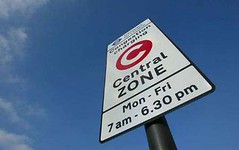UK Official proposes 'Pay-as-you-go' road charge plan
 A sign in London's Central District. Photo by Reuters.
A sign in London's Central District. Photo by Reuters.The BBC reports in "Pay-as-you-go' road charge plan" that Britain proposes to scrape registration and gasoline excise taxes in favor of a plan to charge based on mileage.
"Drivers could pay up to £1.34 a mile in "pay-as-you go" road charges under new government plans. The transport secretary said the charges, aimed at cutting congestion, would replace road tax and petrol duty. Alistair Darling said change was needed if the UK was to avoid the possibility of "LA-style gridlock" within 20 years. Every vehicle would have a black box to allow a satellite system to track their journey, with prices starting from as little as 2p per mile in rural areas."
£1.34 = $2.42
As I have discussed previously, about 60% of the cost of roads isn't covered by gasoline excise taxes. Granted that roads do benefit all of us, but benefit disproportionately the drivers of automobiles. Since costs (and this doesn't even get into the provision of public space for parking and other inducements to drive) aren't covered by excise taxes, driving is encouraged, perhaps beyond the ability to fund and maintain the road system, given current conditions.
_________________
In other news Mayor Ken Livingstone of London suggests that other cities adopt the daily congestion charge that London adopted in 2003.
SAN FRANCISCO (AP) — The mayor of London told a gathering of world mayors Friday that they could unclog city streets and fight global warming by charging hefty fees to drive in congested areas of their communities.
Mayor Ken Livingstone said making drivers pay a "congestion charge" to drive in central London has improved traffic flow and reduced emissions of "greenhouse gases" blamed for raising temperatures and changing weather patterns worldwide. The $9 fee has forced people out of their cars and filled city buses, subways and sidewalks, he told mayors assembled here for the United Nations World Environment Day Conference...
Livingstone, who was elected to his first term as London mayor in 2000 and re-elected last year, introduced the fee in February 2003 to relieve his city's traffic-choked streets. Revenues are reinvested in the public transportation system.
Despite protests, Livingstone imposed the fee on drivers entering an eight-square-mile area of central London that includes its financial and entertainment districts between 7 a.m. and 6:30 p.m.
Drivers who enter central London must buy daily, weekly or yearly passes and register their license plate numbers. A network of 800 cameras photographs license plates within the zone, and drivers who have not paid are fined. A recent government study found that congestion inside the zone has fallen by 30%.



0 Comments:
Post a Comment
<< Home